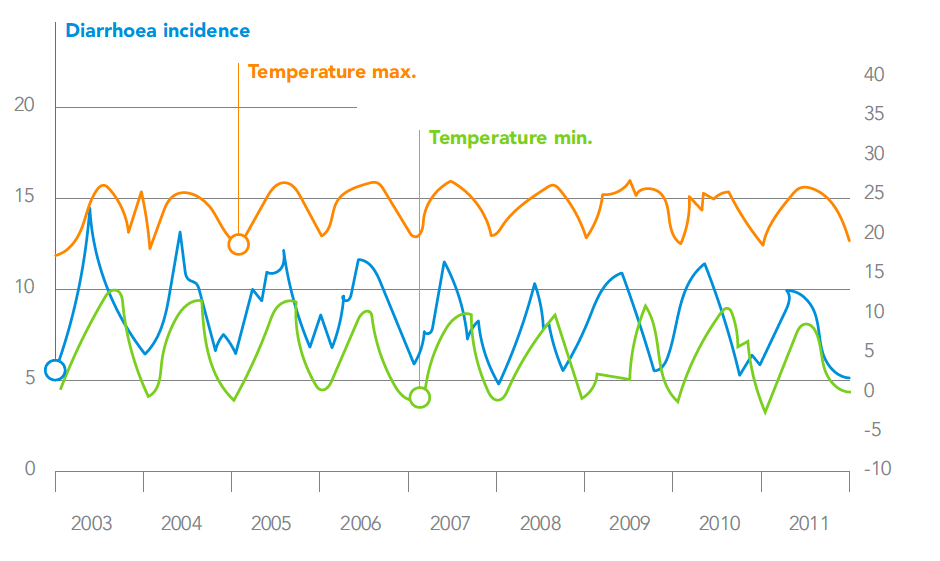Vulnerability and adaptation assessment: Identifying climate information and decision needs in Bhutan

Climate services for health begin with research, or are based on research that establishes the associations of climate and weather conditions with health outcomes, risk factors, or health service delivery performance. Understanding the “climate signals” which may play a role in disease outcomes are required for any application of climate information to decision-making.
Research for climate services may come in many forms, since a broad range of technical and context-specific information is needed to develop products and design effective services. Research activities often fall into three categories:
Applied research includes investigations undertaken to acquire knowledge about a specific practical aim or objective, such as understanding the linkages between climate conditions and health outcomes; the relative need for and value of climate information; data validation and development; and specific analytical methodologies to assess model validity and uncertainty.
Product research and development can include purpose-based activities for the generation of sufficient know-how to develop tailored climate information products and services. Some examples include: exploration of context-appropriate data collection, data digitalization and data transferring systems, analysis and refinement of the sensibility of the service to detect certain levels of climate-related risks, comparative evaluation of different risk indicators or exploration of information visualization and communication tools.
Operations research draws upon management and organizational sciences, using qualitative or quantitative techniques to explore and generate practical knowledge and know-how on climate services application. Operations research is applicable to the entire climate services development process, and can include analyses on: the demand for and readiness of communities or organizations to use a climate service; the optimal internal administrative and human resources structures needed for the successful application and sustainability of the service; the legal institutionalization of the service; the best stakeholder coordination and information-sharing mechanisms; as well as cost-efficiency assessments.
Applied research helps define priorities for health care delivery using an evidence-based approach, and provides new information on the potential uses and limitations of climate services. This type of research is also important for exploring the potential benefits from developing decision tools relative to other public health interventions; and can help identify needs and justify investments in climate services for health, as well as identify data related shortcomings or issues.
Product research and development is crucial to the development of functional and reliable climate services that meet user-needs. User-centered approaches in which users are involved in the product development should be prioritized.
These approaches allow for timely feedback on progress and user-specifications, and testing of prototypes before the service is rolled out on a larger scale. They help ensure that climate services are valid, quality controlled, and reliable; use appropriate technology for target users; and provide relevant information which is accessible, interpretable and usable.
Operations research generates evidence on how to best support climate services with suitable administrative, organizational and legal structures that enhance application and sustainability. It helps optimize the use of resources during climate service implementation, such as by building on existing climate products. Operations research is crucial for ensuring that implemented climate services achieve the greatest benefits, with the lowest resource burden possible.
Iterative research and information collection for feedback is essential prior to development of climate products or services. It informs product specifications, user needs and requirements, and identifies optimal communication and application. Research methodologies range from quantitative analyses, to focus groups and surveys for exploring community perceptions and human resource capacities. The following types of research are commonly used: